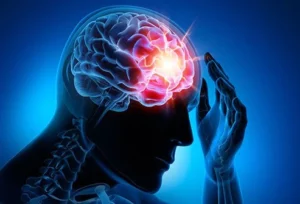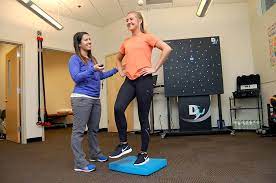Concussions are a serious issue, and they need to be treated as such. If you or someone you know has suffered from a concussion, it is important to seek out concussion therapy as soon as possible. In this blog post, we will discuss everything you need to know about concussion therapy. We will cover what it is, how it works, and who can benefit from it. We will also provide some tips for finding the right therapist for you!
Contents
What Is A Concussion?
 A concussion is a type of brain injury that occurs when the head is hit or jolted. Concussions can happen during car accidents, falls, sports injuries, and other collisions. This is considered a “mild” brain injury because it usually doesn’t result in unconsciousness.
A concussion is a type of brain injury that occurs when the head is hit or jolted. Concussions can happen during car accidents, falls, sports injuries, and other collisions. This is considered a “mild” brain injury because it usually doesn’t result in unconsciousness.
However, concussions can still cause serious symptoms that can last for days, weeks, or even longer. This is a condition where rest and mental relaxation are crucial for recovery.
According to studies, it is estimated that concussions occur in 1.6 to 3.8 million people every year in the United States. It is characterized by a complex pathophysiology with features of both structural damage and functional impairment.
There is still a lot unknown about concussions, but researchers have made significant advancements in recent years. With more awareness and understanding, it’s hoped that concussions can be properly diagnosed and treated to help people make a full recovery.
How Can Therapy Help?
There is no one-size-fits-all answer to this question, as the type and severity of concussion will dictate the best course of therapy. However, there are some general principles that apply to most cases of concussion.
The first step in any concussion therapy program is rest. This means reducing or eliminating physical and mental activity in order to allow the brain to heal. For some people, this may mean taking a few days off from work or school. For others, it may mean complete bed rest for a week or more.
Once the initial rest period is over, a gradual and controlled increase in activity is important. This could involve starting with light exercises such as walking or gentle stretching, and then slowly adding more strenuous activities as tolerated.
The process of concussion therapy is often overseen by a physiotherapist or other health care professional. They will help to create an individualized program based on the specific needs of the patient. Therefore, if you have suffered a concussion, it is important to seek out professional help in order to ensure that you recover properly.
What Are Some Different Types Of Concussion Therapy?
 When it comes to concussion therapy, there is no one-size-fits-all approach. The type of therapy that is right for you will depend on the severity of your concussion, as well as your symptoms. Here are some of the most common types of concussion therapy:
When it comes to concussion therapy, there is no one-size-fits-all approach. The type of therapy that is right for you will depend on the severity of your concussion, as well as your symptoms. Here are some of the most common types of concussion therapy:
Physical therapy
It is one of the types of concussion therapy that can help you recover from a concussion by improving your balance, coordination, and strength. For example, physical therapy exercises may help you learn to walk without stumbling, and can also help improve your memory and thinking skills. This type of therapy is used to help people with concussions that have lasting effects, such as problems with balance or coordination.
Cognitive therapy
This type of concussion therapy can help you manage your symptoms and improve your thinking skills. For example, cognitive therapy may help you learn new ways to manage stress or help you better understand how your injury is affecting your life. This type of therapy is often used in combination with other types of concussion therapy, such as physical therapy or occupational therapy.
Speech therapy
Speech therapy is also a part of concussion therapy. A speech therapist can help people with a concussion regain their ability to speak clearly and be understood by others. The therapist will also work on helping the person to swallow properly and overcome any difficulties with eating. As some people with a concussion may have trouble swallowing because of the changes in their brains.
Acupuncture
It is a form of therapy that has been used for centuries in Asia. It is painless, and it is based on the belief that there are energy lines running through the body. When you have a concussion, these lines become blocked, and acupuncture can help to unblock them. For example, it is said to help improve blood flow and reduce inflammation.
Occupational therapy
 An occupational therapist can help people with concussion-related problems with their job, schoolwork, or daily activities. The therapist will assess the person’s abilities and limitations. Then, the therapist will work with the person to find ways to stay safe and independent.
An occupational therapist can help people with concussion-related problems with their job, schoolwork, or daily activities. The therapist will assess the person’s abilities and limitations. Then, the therapist will work with the person to find ways to stay safe and independent.
All in all, these are some examples of concussion therapies that can help people cope with the symptoms of a concussion. If you or someone you know has sustained a concussion, be sure to seek medical attention and follow the treatment plan prescribed by a healthcare professional.
Which Is The Best Approach To Treat This?
Concussion therapy is a broad term that can encompass many different approaches. The main goal of concussion therapy is to help the individual heal and recover from the symptoms associated with a concussion.
There is no one “right” approach to treating a concussion and different people will respond to different treatments. For example, if someone is struggling with headaches and sleep disturbance they may respond well to chiropractic care or acupuncture. Someone who is having trouble with memory or concentration might benefit from cognitive rehabilitation therapy.
It is important to find a concussion therapist who is experienced in treating concussions and who can tailor the approach to your individual needs. With the right treatment, most people will make a full recovery from a concussion.
What Helps Concussion To Heal Faster?
 It is important to give your brain the time it needs to heal after a concussion. You can do some things to help yourself feel better while you are waiting to see your healthcare provider or after your provider has said it is okay to start your normal activities again.
It is important to give your brain the time it needs to heal after a concussion. You can do some things to help yourself feel better while you are waiting to see your healthcare provider or after your provider has said it is okay to start your normal activities again.
- Get plenty of rest. You may need more sleep than usual.
- Cut down on activities that are mentally demanding, such as video games, texting, schoolwork, and social media.
- Avoid alcohol.
- Do not take any drugs, herbs, or supplements without talking to your healthcare provider first. This includes over-the-counter medicines.
- Eat healthy foods.
- Drink plenty of fluids, such as water and juices.
- Avoid bright lights and loud noises.
- Take breaks often when you are doing any activity, such as reading or using a computer.
- Do not smoke.
The process of recovering from a concussion can be different for everyone. Some people may start to feel better in just a few days, while others may have symptoms that last for weeks or even months. It is important to follow your doctor’s instructions and not return to your normal activities until you have been cleared by a medical professional.
If you are still experiencing symptoms after a few weeks, you may need to see a specialist for further evaluation. Concussion specialists are trained in the diagnosis and treatment of concussions and can help you get on the road to recovery.
When Can I Return To My Normal Activities?
 Most people who have concussions feel better within a few weeks. However, some people may have symptoms that last for months or even longer.
Most people who have concussions feel better within a few weeks. However, some people may have symptoms that last for months or even longer.
If you have had a concussion, you should not return to your normal activities until your healthcare provider says it is okay. This includes exercise, work, school, and social activities. Your provider will tell you when it is okay to start your activities again. He or she may also give you some restrictions, such as no contact sports.
So, there is no set time that you will need to wait before returning to your activities. It all depends on how you feel and what your provider says. Some common factors that impact your return to activities are:
- How severe are your concussion symptoms are
- If you have had a concussion before
- Your age
- Other health conditions that you have
If you push yourself to return to your activities too early, you may have a longer recovery. You may also be at risk for another concussion. Therefore, calm yourself, and let your body fully recover before returning to your activities.
How To Find The Right Concussion Therapist For You?
When you suffer from a concussion, it is vital to seek out the help of a trained professional in order to ensure a full and speedy recovery. But with so many different types of concussion therapists out there, how can you be sure you are choosing the right one for your needs? Here are some important factors to consider when making your decision:
Training and Certification
The first thing you should look for when choosing a concussion therapist is proper training and certification. There are many different organizations that offer certification for concussion therapists, so be sure to ask about this before making your decision.
Experience
In addition to proper training and certification, you will also want to choose a therapist with ample experience in treating concussions. Ask about the therapist’s success rate with previous patients and how long they have been treating concussions specifically.
Treatment Methodology
There are many different ways to treat a concussion, so you will want to make sure the therapist you choose uses a method that you are comfortable with. Be sure to ask about the specific techniques they use and whether or not they have had success with them in the past.
Cost
Cost is always an important consideration when choosing any type of healthcare provider. Be sure to ask about the therapist’s fee structure upfront so there are no surprises down the road.
Insurance Coverage
Another important factor to consider is whether or not your insurance plan will cover the cost of treatment. Many therapists will accept insurance, but some may not so be sure to check with your provider before making your decision.
By taking the time to consider each of these factors, you can be sure you are choosing the right concussion therapist for your needs. With the right treatment, you can expect a full and speedy recovery.
Conclusion
In conclusion, concussion therapy is a vital step in the healing process after a concussion. It can help to speed up the healing process and improve symptoms. There are many different types of concussion therapy, so it is important to talk to your doctor or therapist to find out which type is right for you.
As choosing the right concussion therapy is essential for a full and speedy recovery, reach out to us today. Our team of experts will work with you to create a personalized treatment plan that fits your needs. Contact us today to learn more!
Physical Therapy help patients recover from pain. If you’re experiencing Back pain, Shoulder pain, Knee pain, Neck pain, Elbow pain, Hip pain, or Arthritis pain, a physical therapist at MantraCare can help: Book a physiotherapy session.


